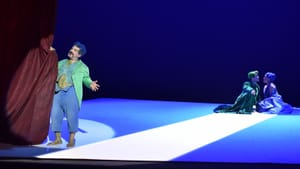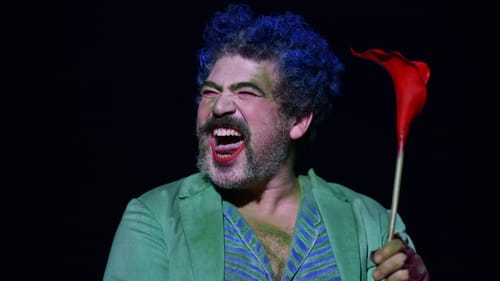Stay in the Loop
BSR publishes on a weekly schedule, with an email newsletter every Wednesday and Thursday morning. There’s no paywall, and subscribing is always free.
More tuneable than lark to shepherd's ear
Opera Philadelphia presents Benjamin Britten and Peter Pears’s ‘Midsummer Night’s Dream’

Opera Philadelphia presents the U.S. premiere of Robert Carsen’s well-traveled take on Benjamin Britten’s A Midsummer Night’s Dream, and the staging casts a spell worthy of Shakespeare. Even the near-constant cacophony of coughers, chatterers, and cellophane crinklers at the run’s second performance couldn’t dim the magic on display.
Britten’s best?
The production has been in circulation since 1991 — it’s older than some of the singers in the cast — and it takes little thought to understand why it endures. It shows Carsen at his directorial best, featuring what now seem trademark touches of his aesthetic vision: color-blocked sets (by Michael Levine, also the costume designer) that serve as a canvas for evocative lighting; an overarching sense of play-within-a-play spectatorship; and lots of sexual tension. It foregrounds humor, which helps the piece immensely.
Many critics and fans rank Midsummer as Britten’s best work. I’m not among them — give me Gloriana or The Turn of the Screw any day. The English composer’s foray into light comedy contains many of the musical elements that branded him a unique and important artist, but it also lacks the whimsical dimension so central to its source. The score often sounds thorny and cerebral.
Tedious brief highlights
Carsen thus goes a long way in adding levity to the proceedings. (Stage director Emmanuelle Bastet oversees the current production.) Take, for example, his treatment of the Rude Mechanicals’ performance of Pyramus and Thisbe, the “tedious brief scene” given for the wedding of Duke Theseus and Hippolyta. It often comes across as excessively tedious and anything but brief. Yet here, through a sharp blend of physical comedy and performative awareness, it becomes a highlight of the production.
Smart too is Carsen’s casting of an adult actor in the nonsinging role of Puck, rather than the customary cloying juvenile. Opera Philadelphia features Miltos Yerolemou — known to Game of Thrones fans as Syrio Forel — who plays the role as something close to a Chaplinesque tramp. A deft physical comedian, he thrusts and splays himself around the Academy of Music’s vast stage with seemingly rubber limbs. He possesses a great stage voice and manages to communicate the appropriate sense of spritely otherworldliness without going overboard.

‘Midsummer’ voices
The opera itself would sound better in a smaller house, though music director Corrado Rovaris leads a stylish and, when appropriate, propulsive reading of the score. Some of the singers also seem more suited to the chamber setting. As Oberon and Tytania, the fairy king and queen, countertenor Tim Mead and soprano Anna Christy offer elegant characterizations that compensate for slightly undersized voices. Christy especially excels in Tytania’s burlesque-tinged seduction of the ass-headed Nick Bottom, sung here by Curtis-trained bass Matthew Rose.
Rose takes top vocal honors all around, with not a single crag on display in his sonorous, well-produced voice — which he effortlessly lightens when required for comic effect. The entire slate of Rude Mechanicals stand out here in ways they rarely do. Tenor Miles Mykkanen shows himself a young artist to watch as Francis Flute (the role most often sung by Peter Pears, Britten’s life partner and the opera’s co-librettist).
As the four young lovers who propel the action, soprano Georgia Jarman (Helena), mezzo Siena Licht Miller (Hermia), tenor Brenton Ryan (Lysander), and baritone Johnathan McCullough (Demetrius) could hardly be bettered. Ryan sings with an especially pleasing ardor, and Miller — a current Curtis student — impresses mightily in her first major assignment with Opera Philadelphia.
If one element warrants improvement, it would be the Philadelphia Boys Choir, who portray Tytania’s train of fairies. Under Jeffrey Smith’s direction, their delivery is often unintelligible — when it happens to be audible.
Britten’s work seems a tough sell to audiences weaned on the bread-and-butter operatic repertory, and there were noticeably quite a few unoccupied seats the afternoon I attended. Philadelphia music lovers should make a point of attending the final performance on February 17.
What, When, Where
A Midsummer Night’s Dream. By Benjamin Britten and Peter Pears, after William Shakespeare; Robert Carsen directed. Opera Philadelphia. Through February 17, 2019, at the Academy of Music, 240 S. Broad Street, Philadelphia. (215) 732-8400 or operaphila.org.
Sign up for our newsletter
All of the week's new articles, all in one place. Sign up for the free weekly BSR newsletters, and don't miss a conversation.

 Cameron Kelsall
Cameron Kelsall